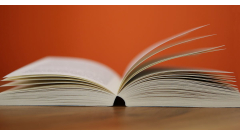Enhancing your writing skills can feel like a daunting task, but it doesn’t have to be! With the right tools at your fingertips, you can transform your writing from ordinary to extraordinary in no time. One invaluable resource is a pocket dictionary—a powerful companion that fits right in your bag, ensuring that you always have access to the wealth of words it contains.
In this guide, we'll explore how to harness the capabilities of Merriam-Webster's Pocket Dictionary to elevate your vocabulary and writing prowess. Whether you’re crafting essays, reports, or creative pieces, this handy reference will not only help you discover new words but also enrich your understanding of existing ones, paving the way for clearer and more engaging communication.
Merriam-Webster's Pocket Dictionary, Newest Edition, is your go-to reference for enhancing language skills. Compact and convenient, it offers a wealth of definitions, synonyms, and word usage tips right at your fingertips. This flexi paperback edition is designed for versatility, whether you're writing creatively or academically, allowing you to confidently express your thoughts with clarity and precision.
Finding Definitions Quickly
Using the Merriam-Webster's Pocket Dictionary, Newest Edition, (Flexi Paperback) is a practical way to enhance your writing skills by enabling you to find definitions swiftly. Start by familiarizing yourself with the alphabetical organization of the entries. Each word is sorted from A to Z, making it essential to understand how to locate the initial letter of the word you’re searching for. Once you know the starting letter, you can efficiently navigate the dictionary’s pages to the corresponding section.
With each page displaying guide words at the top—words that represent the first and last entries on that page—you can quickly assess whether your target word lies on that page or if you should move to the next one. To make this process even faster, consider these techniques:
- Flipping through the pages swiftly allows you to spot the relevant section faster.
- Use your finger as a pointer to guide your eyes along the lines of text more effectively.
- When reaching a page with guide words indicating your target word falls within that range, slow down to read the entries more carefully.
Additionally, utilizing the flip-through technique will enhance your dexterity in navigating the dictionary. Consider these tips:
- Practice often to increase your familiarity with how the words are organized.
- Memorize common prefixes or suffixes, as they can give clues about where a word might be located.
- Familiarity with common entries will help you scan quickly.
Pronunciation Guide Usage
Utilizing the pronunciation guide in Merriam-Webster's Pocket Dictionary, Newest Edition, (Flexi Paperback) can significantly improve your writing and speaking skills. This guide features reliable phonetic spellings and pronunciation symbols that are essential for mastering the sounds of English words. Begin by locating the pronunciation key, typically found at the beginning of the dictionary, which will provide you with an overview of the symbols used to represent different sounds.
Common symbols to be familiar with include:
- /æ/ as in “cat”
- /i:/ as in “see”
- /ʌ/ as in “cup”
- /θ/ as in “think”
- /ʤ/ as in “judge”
After reviewing these symbols, choose a word you want to practice and refer to its phonetic spelling in the dictionary. For example, the word "acquaintance" is spelled phonetically as /əˈkwāntəns/. Break down the components of the pronunciation; each symbol corresponds to a specific sound. To enhance your skills further, listen to native speakers pronounce the word, then repeat it out loud while focusing on how your mouth and vocal cords create similar sounds. Regularly practicing this method will help you become more comfortable with pronunciation, ultimately enhancing your overall writing and speaking proficiency.
- Engage with audio resources to hear the correct pronunciation.
- Practice with a friend, alternating between speaking and listening.
- Record yourself to monitor your pronunciation and self-correct.
Exploring Synonyms and Antonyms
Merriam-Webster's Pocket Dictionary, Newest Edition, (Flexi Paperback) (Pocket Reference Library) is an invaluable resource for any writer looking to enrich their vocabulary and improve their writing style. One of the most effective ways to accomplish this is by exploring synonyms and antonyms. When searching for synonyms—words that have similar meanings—simply locate the main entry word in the dictionary. Each entry often includes a section or thesaurus list that highlights synonymous words. This method allows writers to replace words that may feel repetitive or stagnant with fresher alternatives. This diversity not only makes your writing more engaging but also helps convey your ideas with precision and flair.
Finding antonyms—words that convey opposite meanings—works similarly. After identifying the original word, check the same entry for antonyms listed nearby or in a separate section focused on opposites. Utilizing both synonyms and antonyms contributes to a more nuanced vocabulary. Incorporating these words into your writing can be straightforward. Consider the context of your sentences and think about the tone and meaning you wish to convey. Adding variety can also serve to create strong contrasts or highlight specific emotions.
- Experiment with synonyms to capture different shades of meaning.
- Utilize antonyms in particular sentences to emphasize contrasts.
- Keep a list of new words you encounter for future reference.
- Make it a habit to replace commonly used words with their synonyms before finalizing your drafts.
Understanding Word Origins
Unlocking the power of words begins with understanding their origins. Merriam-Webster's Pocket Dictionary, Newest Edition, serves not only as a quick reference for definitions but also provides a treasure trove of etymological insights. To look up the etymology of a word, simply locate your desired word in the dictionary. Typically situated right below the word’s definition, the etymology will describe the word's roots, including its language of origin and possible transformations over time. This feature can deepen your understanding of vocabulary and enrich your writing skills immensely.
Understanding word origins can significantly enrich your writing. Historical context influences word choice, allowing you to select language that resonates with your audience. For instance, the word "auspicious" derives from the Latin word "auspicium," which referred to bird-watching for omens—a practice deeply embedded in ancient cultures. Understanding this context not only enhances your vocabulary but also guides your word choice to convey the right emotions and messages in your writing. The richness of words shared in Merriam-Webster’s Pocket Dictionary can encourage varied expressions and potentially elevate your prose to new artistic heights.
- Delve into the backgrounds of words to find nuances that may suit your writing style.
- Use historical context to draw parallels in themes and create engaging narratives.
- Enhance your vocabulary with words that carry weight and evoke specific imagery.
Using Word Grids for Vocabulary Expansion
Creating word grids with entries from Merriam-Webster's Pocket Dictionary, Newest Edition, serves as a powerful and exciting method for enhancing your vocabulary and improving your writing style. Begin by selecting a specific word from the pocket dictionary that interests you or that you frequently use. Once you have your target word, jot it down in the center of a piece of paper. Next, explore the dictionary for synonyms, antonyms, and related terms, and position these words around the central word in a grid-like format. This visual arrangement not only helps you see the connections between words but also provides a quick reference to enrich your writing with varied vocabulary.
Utilizing these word grids for brainstorming can further deepen your understanding of the nuances of each word. As you start crafting your writing, refer back to these grids to substitute overused adjectives and verbs with more vibrant choices. This approach encourages linguistic flexibility, ensuring your writing reflects a broader range of expression. Engage with the following steps to maximize your word grid experience:
- Challenge yourself to create a grid for at least five different words each week.
- Incorporate new vocabulary from your grids into daily writing exercises.
- Color-code the grid for different parts of speech—nouns, verbs, adjectives, etc.
- Share your grids with peers for collaborative brainstorming sessions.
Enhancing Clarity in Writing
Improving clarity in writing is essential for effective communication, and one effective way to achieve this is by utilizing Merriam-Webster's Pocket Dictionary, Newest Edition. The dictionary serves as a powerful tool for selecting the most appropriate words that elevate your writing. When faced with vague or ambiguous terms, simply consult this pocket-sized reference to discover precise alternatives. For instance, instead of using the word "good," explore synonyms like "excellent," "superior," or "exceptional," each showcasing a specific quality that enriches your sentences. Engaging with the dictionary not only refines your vocabulary but also broadens your understanding of nuanced differences between similar words.
Additionally, consistent practice in utilizing this dictionary enables you to identify and replace vague words with specific terms that enhance overall readability. Whenever you write, make it a habit to highlight any expressions that seem to dilute your message. Take a moment to reference Merriam-Webster's Pocket Dictionary and find alternatives that convey your thoughts more clearly. This method transforms your writing from generic to vivid, capturing the essence of your ideas more effectively. Consider these tips for refining your word choices:
- Seek synonyms for common adjectives to describe your subjects more vividly.
- Replace generic verbs with action-oriented ones that create more dynamic narration.
- Use the dictionary to understand subtle connotations of words to ensure the right tone in your writing.
- Challenge yourself to avoid overused adjectives and adverbs by finding more interesting alternatives.
Learning New Words Daily
Incorporating the use of Merriam-Webster's Pocket Dictionary, Newest Edition, into your daily routine can significantly boost your vocabulary. To establish a productive word-learning habit, start by selecting a new word each day from your dictionary. This can be a word that catches your eye or one that seems useful for your writing projects. By focusing on just one word, the task becomes manageable, allowing you to devote your full attention to understanding its meaning, pronunciation, and usage.
Once you’ve chosen your word, take a few moments to delve deeper. Look up its definition, any synonyms or antonyms, and its grammatical forms. Try to memorize the word by creating a mnemonic or associating it with an image or a personal experience. Additionally, utilize the word in context by formulating sentences or writing prompts. This practical application cements the new vocabulary in your memory. Here are some tips to integrate the word into your daily life:
- Write a sentence that describes your day using the new word.
- Engage in a conversation and try to incorporate the word naturally.
- Create a flashcard for the word, writing the definition and an example sentence.
- At the end of the week, review all the words you’ve learned and revisit your sentences.
Related Products
Recognizing Homophones and Homographs
Enhancing your writing skills is an ongoing journey, and using Merriam-Webster's Pocket Dictionary, Newest Edition (Flexi Paperback) serves as an invaluable companion on this path. One essential aspect of writing clearly is understanding homophones and homographs. Homophones are words that sound the same but have different meanings, such as "pair" and "pear." Homographs, on the other hand, are words that are spelled the same but can differ in pronunciation and meaning, like "lead" (to guide) versus "lead" (a type of metal). Recognizing and correctly using these words can significantly impact your writing's clarity and precision.
To identify homophones and homographs in your pocket dictionary, start by looking up words you frequently use. Consider the context in which you’re writing and ask yourself if any of the words you use may sound similar or share spelling with others that have entirely different meanings. Using exercises can further sharpen your skills:
- Create sentences using pairs of homophones to illustrate their meanings, such as “I will buy a new pair of shoes” versus “I saw a pair of birds.”
- For homographs, write out sentences utilizing both meanings, like “The wind blew so hard that it was difficult to wind the clock.”
- Utilize examples from Merriam-Webster's Pocket Dictionary to deepen your comprehension.
- Frequent review of tricky words to solidify your knowledge.
- Experiment with writing prompts that force you to confront homophones and homographs directly.
Improving Grammar and Usage
Using Merriam-Webster's Pocket Dictionary, Newest Edition, can significantly enhance your writing skills, particularly when it comes to improving grammar and word usage. This handy resource allows you to verify the correct grammatical forms and provides examples of usage that can guide your writing style. To get the most out of this pocket dictionary, follow these tips:
- Whenever you come across a word you're unsure about, consult the dictionary to check its part of speech, which is vital for proper sentence construction. For example, knowing whether a word is a noun, verb, or adjective ensures that you use it correctly within the context of your writing.
- Take note of usage notes included for words that often confuse writers. The dictionary provides guidance on how to use certain terms correctly in various forms—such as singular and plural—as well as their proper conjugations.
Furthermore, to steer clear of common grammatical pitfalls, consider these resources:
- Explore relevant sections within the dictionary that address frequently misused words and phrases. This not only helps in contextual understanding but also reinforces the correct choice of vocabulary, reducing errors.
- Utilize the pocket dictionary’s comprehensive guides that outline common grammatical structures, aiding in constructing clear and effective sentences.
Developing an Active Reading Habit
Enhancing your writing skills requires you to continually expand your vocabulary and understanding of the language. One effective way to achieve this is by integrating Merriam-Webster's Pocket Dictionary, Newest Edition, (Flexi Paperback) into your reading routine. This portable resource allows you to quickly look up unfamiliar words as you encounter them, bridging gaps in comprehension and lending richness to your own writing. Begin by keeping the dictionary close during your reading sessions. When you stumble upon a word you don't know, pause and jot it down in a notebook or use a digital note-taking app. Take the time to look up its meaning in the dictionary, as this will help cement your understanding and make it easier to incorporate that word into your future writing efforts.
Furthermore, encourage a habit of curiosity while reading. Challenge yourself to not only note the unfamiliar words but also their usage and context within the sentences you encounter them. This practice allows you to understand nuances and subtleties that are often lost when simply memorizing definitions. You might also consider these strategies to enhance your active reading habit:
- Set a goal for the number of new words to learn each week.
- Utilize the dictionary's examples to see how words are used in various contexts.
- Read aloud occasionally, as this can improve retention and pronunciation.
- Engage with different genres and authors to expose yourself to diverse vocabulary.
- Revisit and revise the notes of unfamiliar words regularly, solidifying your learning.
Why We Chose This Product
This guide is centered around Merriam-Webster's Pocket Dictionary for a simple yet powerful reason: its unmatched reliability and compact size. With a legacy that spans generations, Merriam-Webster has been a trusted name in language and lexicon. Its pocket edition is particularly convenient, making it perfect for writers on the go who need quick access to definitions and synonyms.
- Comprehensive word coverage
- User-friendly layout
- Ideal for everyday use
- Perfect for enhancing both writing and speaking
Choosing this pocket dictionary means choosing a tool that can grow with you. As you use it, you’ll find not just answers, but a deeper appreciation for the nuances of the English language—making every writing endeavor an opportunity for learning and creativity.
Merriam-Webster's Pocket Dictionary, Newest Edition, is your go-to reference for enhancing language skills. Compact and convenient, it offers a wealth of definitions, synonyms, and word usage tips right at your fingertips. This flexi paperback edition is designed for versatility, whether you're writing creatively or academically, allowing you to confidently express your thoughts with clarity and precision.










